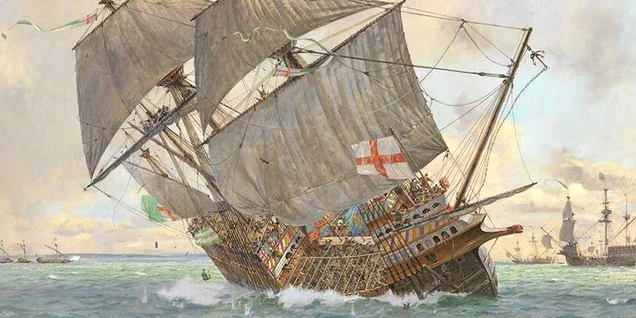Jacques Francis: Salvage Diver Diving for the King
On July 19, 1545, Henry VIII’s warship the Mary Rose was lost within minutes of leaving dock. About to take action against a French invasion, it sank while the King watched. Built between 1509-1511, she had seen 34 years of service and was a pride ship of Henry’s “Army by the Sea.” Of the 400 - 500 seamen aboard, most lost their lives that day.
This event was to mark a significant chapter in the history of black Tudors (*The term “people of color” was not in use in the 16th century.) At this time in England, there were approximately 300 Africans living in the country. Coming from Africa, Europe and the Spanish Caribbean on merchant vessels, or with pirates, privateers or aristocrats, they were free people in England. There were no slaving laws in Tudor England. Class, religion and talent were more important distinctions than color.
Black Tudors in England were respected members of society. They earned wages, testified in court, and climbed the social hierarchy. There are records of marriages, baptisms, and burials of black men and women. These include parish records, exchequer papers, petitions and letters.
Jacques Francis played an important role in the history of the Mary Rose and as a court witness. In the 16th century there were no competent English salvage companies. As the Mary Rose was one of the first English warships to carry heavy cannons and weaponry, it was a large investment, and Henry wanted to recover as much of it as he could.
Venetian Piero Paolo Corsi was hired for the salvage operation after the failure of other crews to recover weapons or raise the ship. Jacques Francis was part of Corsi’s crew. Francis was a 20-year-old pearl diver from Guinea, West Africa. We are not certain of the circumstances under which he arrived in England, but he was appointed head diver on the Mary Rose salvage effort in 1546. Corsi’s team was able to recover some of the weaponry.
Corsi and his crew moved on to another salvage job in 1547. The Sancta Maria and Sanctus Edwardus merchant ship caught fire and sank two miles from Southhampton on her way to Italian ports. Corsi was later accused by Italian merchant Domenica Erizzo of theft from the salvage dive. Corsi ended up a prisoner in the tower of London.
Corsi’s case was heard before the High Court of Admiralty in front of a jury of Navy admirals. Jacques Francis was called upon to testify on his boss’s behalf. The Italian merchants denounced Francis as an “uncivilized man”, a “slave”, and an “infidel borne” and thus, claimed that Francis had no right to speak in a European court. We do not know the final outcome of this case, but we do know that Piero Corsi was arrested some time later for theft from another salvage job.
Jacques Francis became the first African witness to give firsthand evidence in an English court of law. This helped show that Africans in Tudor England were not enslaved and were accorded the same rights by law as other Englishmen of their class. Evidence that Henry VIII gave a wedding present to Jacques Francis on the occasion of Francis’ marriage in 1512 serves to bolster this point.
After his marriage, Jacques Francis drops from any official record.
How do you imagine Francis’ life played out after his marriage?
Why do you think he disappears from the record?
Sources:
Kaufmann, Miranda. Black Tudors. London, Oneworld Publications, 2017.
http://thinkafrica.net

